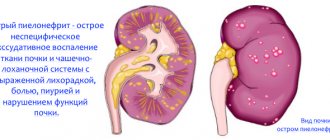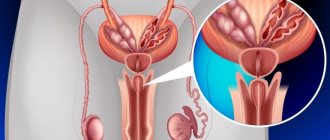Urethritis is an inflammatory disease of the excretory system involving the urethra, in which infectious microorganisms multiply. Both men and women are affected with the same frequency of the disease. In the fairer sex, urethritis most often develops during pregnancy.
The entry of infectious agents into the female genitourinary system leads to changes in the vaginal microflora. The result of this is inflammation of the urethra.
Causes of urethritis during pregnancy
The state of pregnancy is stressful for the female body. During this period, most representatives of the fairer sex experience a decrease in immunity and hormonal disruptions occur. As a result, the body's defenses are greatly weakened.
Many pathogens: gonococci, chlamydia, ureplasma, which can cause urethritis, can live quietly in a woman’s body and become active only after conception. The state of pregnancy creates prerequisites for the proliferation of bacteria, which in most cases is the main cause of urethritis.
In addition, there are a number of provoking factors that contribute to the development of the inflammatory process in the urethra.
Among them are:
- eating large amounts of spicy and fried foods;
- injury to the urethra by stones;
- hypothermia of the body;
- non-compliance with the drinking regime: a woman during pregnancy should drink at least one and a half liters of liquid during the day;
- failure to comply with personal hygiene rules;
- urological infections;
- venereal diseases;
- the occurrence of allergic reactions;
- functional disorders of the genitourinary system;
- frequent overwork;
- stress;
- pressure on the urethra that occurs when carrying a child;
- congenital defects caused by the peculiarities of the anatomical structure of the urinary canal;
- disruption of the circulatory process in the pelvic organs;
- excessive physical activity.
The cause of the development of non-infectious urethritis may be allergization of the body caused by the consumption of certain foods or the use of household chemicals.
Burning and pain when urinating during pregnancy in women
During gestation, a woman’s body becomes vulnerable and susceptible to many diseases.
In addition, she has to experience different sensations, which is due to physiological and hormonal changes.
A burning sensation after urination during pregnancy should cause anxiety and wariness - a symptom familiar to many, often indicating the development of an infectious-inflammatory process.
Burning sensation during urination in pregnant women
When a woman has successfully become pregnant, in the second month she experiences nausea, drowsiness and increased urine output, including at night. Even a nagging pain when urinating during pregnancy indicates relaxation of the muscles of the uterus and bladder for a comfortable course of the entire period of gestation.
At a later stage, already from the 26th week, the fetus is actively developing, and the uterus increases in size, as a result of which it puts strong pressure on the bladder.
The woman constantly experiences discomfort, often it seems to her that she begins to pull painfully, stabbing in her side on the right or left.
Such phenomena lead to a deterioration in blood circulation, stagnant processes may occur, as a result of which microorganisms begin to actively multiply.
Possible associated symptoms
Burning in the urethra during urination in pregnant women rarely occurs in isolation. It is combined with other characteristic signs, which often indicate such common pathologies as cystitis, urethritis, and in rare cases, more dangerous diseases.
Pain. Sensations localized in the lower abdomen indicate inflammation of the bladder; the development of pain in the lower back indicates kidney pathology. Cramping pain can be the cause of urolithiasis.
Discharge. Leucorrhoea of a cheesy consistency with an unpleasant odor appears with candidiasis (thrush), yellowish in the form of cream - with trichomoniasis, mucopurulent with a greenish tint - with chlamydia.
In addition to these symptoms, a woman often experiences discomfort due to the following manifestations:
- heaviness and fullness in the lower abdomen;
- more frequent urge to defecate, incontinence;
- cramps in the lumbar region and suprapubic area.
Other signs that appear simultaneously with the burning sensation are pain, itching, redness and swelling of the external genitalia and urethra. In the acute course of the pathology, the following may be observed: nausea, vomiting, myalgia, increased body temperature. The nature of urine may also change - it becomes cloudy with admixtures of blood and pus, and an unpleasant odor.
Causes of discomfort
As a subjective sign, burning during urination in women during pregnancy can be disturbing at the beginning or end of voiding, and unpleasant sensations occur both in the urethra, vagina, and in the vulva area - labia, clitoris. The main reasons for this discomfort:
- lack of personal hygiene;
- mechanical injuries of the genital tract or urethra;
- allergic reactions;
- dysbacteriosis;
- candidiasis, thrush;
- inflammatory diseases of the kidneys, bladder, urethra;
- urolithiasis disease;
- cystitis;
- urethritis;
- STI.
Regardless of the impact factor, the occurrence of this symptom during pregnancy requires prompt consultation with a specialist.
Ignoring the problem and consequences
The goal of the expectant mother is to take care of her well-being in order to bear and give birth to a healthy child.
Therefore, if the lower abdomen stings and hurts when urinating during pregnancy, discomfort appears, and especially burning and itching, you should be wary and find out the causes of this condition.
Ignoring the problem and irresponsible attitude towards yourself and the baby can lead to dangerous consequences:
- Penetration of infectious agents into the placenta and infection of the fetus.
- Rupture of the amniotic sac and leakage of amniotic fluid, which often results in premature birth.
- The birth of a premature, weakened baby.
- Intrauterine fetal death.
To avoid the occurrence of these situations, it is necessary to undergo regular examinations, and in case of pain and burning sensation before movements, undergo a timely course of treatment.
Examination to identify the provoking fact
Painful urination and burning sensation during pregnancy in most cases indicate infection or the development of an inflammatory process.
Therefore, consultation with a urologist and gynecologist is mandatory. Ignoring the problem can aggravate the situation and lead to all sorts of complications.
To identify the cause and confirm the diagnosis, the following methods are used:
- gynecological examination in mirrors;
- physical examination, including palpation, percussion and auscultation.
Laboratory research
- General clinical tests of urine and blood.
- Test using the method of Nechiporenko and Zimnitsky.
- Analysis of a smear from the mucous membrane of the urethra, vagina and cervix to determine the composition of the microflora.
- Bacteriological culture of urine to identify the pathogen and its sensitivity to antibiotics.
Instrumental diagnostics
- Colposcopy.
- Radiography.
- PCR. Method for detecting the type of infectious agent and its genome.
- Ultrasound. Examination of the pelvic organs.
- Uroflowmetry. Determines the rate of urine excretion.
- Excretory urography. Research using a dye.
- Linked immunosorbent assay. Method for detecting specific antibodies in blood.
- Cystoscopy. Assessment of capacity, contractility and condition of the bladder walls.
- Cytological examination. It is carried out to exclude a malignant process.
During the examination, the doctor must collect an anamnesis of life and illness, measure temperature, pressure, and determine heart rate. Taking into account these diagnostic results, the doctor makes a decision on further therapy.
Ways to alleviate a woman’s condition
Cutting and burning sensations when urinating during pregnancy cause great discomfort to the expectant mother. And since in her situation it is important to maintain calm and good mood, not to mention health, the provoking factor should be identified, undergo a course of treatment or take other measures to eliminate it.
Drug therapy
Medicines will become an indispensable remedy if burning, sharp pain and itching during pregnancy when urinating are symptoms of any pathology. The choice of a suitable remedy is determined by the etiology of the disorder.
- For a burning sensation of an infectious nature, a course of antibacterial therapy using macrolides, cephalosporins, and penicillins is indicated. Amoxicillin, Azithromycin, and Ampicillin are considered safe during pregnancy.
- Minor allergic discomfort can be eliminated by taking H1-histamine receptor blockers. Zyrtec, Claritin, and Zodak may be prescribed.
- For parasitic burning, the use of antihelminthics is indicated. Pyrantel and Vermox tablets are effective.
Depending on the cause of the burning sensation, the following groups of drugs may be prescribed:
- antiprotozoal - "Metrogil";
- eubiotics – “Acilact”;
- uroantiseptics - “Canephron”, “Cyston”;
- antispasmodics – “Drotaverine”, “No-Shpa”.
Advice! Whatever the reasons for the burning sensation when urinating, a pregnant woman should remember that self-medication is strictly prohibited. This can lead to dire consequences.
Home treatment with folk remedies
In the absence of serious factors that could provoke burning and cutting pain before intercourse, doctors advise using home remedies from the arsenal of traditional medicine:
- infusion based on sage, chamomile, calendula and celandine;
- fruit drinks from berries;
- infusion of licorice root;
- a remedy made from rosehip, barberry, grapes and knotweed.
According to the reviews of many experts, beekeeping products and herbal mixtures of medicinal herbs, which can be bought at any pharmacy (cornflower, bear ears, juniper, mint, linden blossom), can be of good benefit.
Preventing burning sensation when urinating during pregnancy
To minimize the risks of pain, pain and burning during urination, it is important to first avoid hypothermia and not neglect personal hygiene. In addition, doctors recommend the following measures:
- maintain a drinking regime - drink at least 2 liters of liquid;
- wear comfortable underwear made from natural fabrics, refraining from tight clothes and stockings;
- limit your bath time, replacing it with a warm shower;
- before and after sexual intercourse, empty the bladder and wash the vagina with water;
- use barrier contraception;
- prevent injury to the internal and external genitalia;
- diversify your diet;
- Avoid contact with allergens.
The best option should be a healthy lifestyle, proper rest, long sleep, daily walks in the fresh air and a complete cessation of bad habits - smoking and drinking alcoholic beverages.
Conclusion
Unlike diseases that cause pain and burning after urination, this in itself is a subjective sign and does not pose a threat to the health and life of the mother and child. It can be easily eliminated if you carefully observe personal hygiene measures, follow the recommendations of the doctor managing your pregnancy, and do not skip routine examinations.
experience various sensations due to physiological and hormonal changes. A burning sensation after urination during pregnancy should cause anxiety and wariness - a symptom familiar to many, often indicating the development of an infectious-inflammatory process.
Source: https://UroMir.ru/urologija/oshhushhenija-pri-mochevydelenii/zhzhenie-pri-mocheispuskanii-pri-beremennosti.html
Symptoms
Urethritis during pregnancy has pronounced symptoms that appear during periods of exacerbation of the disease. During the incubation period, the disease in most cases goes unnoticed. This is due to the peculiarities of the anatomical structure of the urethra in women, which is irritated during sexual intercourse. Pathological manifestations in pregnant women can occur several days or even months after irritation of the urethra.
Discharge
Inflammation of the urinary canal and its glands is often accompanied by scanty discharge from the urethra, in most cases purulent. Their number usually increases in the morning.
Normally, clear mucus with a white or yellowish tint may be released from the urethra. Impaired secretion is observed during exacerbations of nonspecific urethritis.
With inflammation caused by Trichomonas infection, abundant transparent foamy discharge appears, having a yellowish color. With fungal urethritis in pregnant women, they are curdled.
Discharge from the urethra during pregnancy is a fairly common phenomenon.
The release of bloody or purulent secretion after urination, accompanied by pain and burning, indicates infection of the urethra. In this case, it is recommended to seek medical help.
In a normal situation, changes in secretion are not accompanied by itching and burning, and white discharge from the urethra appears most often due to overwork.
Unpleasant sensations in the urethra
Unpleasant sensations in the urethra indicate the development of an active inflammatory process in the organs of the genitourinary system.
The main symptoms of urethritis in pregnant women include:
- increased urge to urinate;
- pain when emptying the bladder;
- itching, pain in the urethra, burning sensation when urinating;
- cases of incontinence;
- pain in the sacral area;
- swelling of the urethra;
- redness of the entrance to the urinary canal;
- the presence of purulent discharge in the urine.
Chronic urethritis in most cases is sluggish, and the signs of the disease are mild and appear only from time to time.
Consequences of urethritis for the fetus
Urethritis caused by chlamydia and mycoplasma is of great danger. This infection, suffered in the early stages, can cause spontaneous miscarriage. There is also an opinion that it is infectious diseases of the genitourinary area that lead to regression of pregnancy.
Experts have still not been able to find out whether urethritis causes the formation of congenital malformations of the fetus. It is assumed that infectious agents penetrate the embryo, causing the occurrence of various diseases. Moreover, many women who have had urethritis during pregnancy give birth to healthy children. It is not possible to predict in advance the risk of damage to certain organs of the baby due to intrauterine infection.
In the second half of pregnancy, urethritis often becomes the cause of placental insufficiency. The infection spreads upward and, entering the placenta, causes the development of inflammation. This process leads to the fact that the placenta cannot cope with its functions, including transferring oxygen and nutrients to the fetus. Fetal hypoxia develops, often combined with intrauterine growth retardation. Fortunately, such complications are quite rare and can be successfully prevented with timely antibiotic therapy.
Diagnostics
Diagnosis of urethritis is carried out using laboratory and instrumental research methods.
If this disease is suspected, the following is prescribed:
- a general urine test to detect bacteria, mucus and blood;
- a general clinical blood test, which evaluates hemoglobin, determines the level of red blood cells, leukocytes and platelets - these indicators may indicate the development of an active inflammatory process in the body;
- a microscopic smear from the urethra, which allows you to detect the causative agent of the disease that caused urethritis - this method is the most reliable;
- bacterial culture involves the study of biological material in order to determine pathogenic microflora and the degree of its sensitivity to antibiotics;
- ELISA and RIF - studies are carried out to identify antibodies of different classes produced by the human body as a response to infection;
- PRC diagnostics allows you to exclude sexually transmitted infections by detecting bacteria in a smear.
The final diagnosis is made by taking into account the patient’s complaints of poor health and problems with urination.
Treatment
Urethritis during pregnancy requires complex treatment. Therapy should be aimed at eliminating the pathogen and stopping the inflammatory process.
Diseases of viral etiology, including those caused by herpes infection, are treated with antiviral drugs and immunomodulators. Antimycotic agents are used to treat fungal urethritis. If the disease is caused by a bacterial infection, antibiotic therapy is given.
Is it possible to take antibiotics?
The selection of antibiotics during pregnancy requires a special approach. Only those drugs that will not have a negative effect on the fetus should be used. Caution should be exercised at the beginning of pregnancy, since during this period the formation of the baby’s internal organs occurs. Some antibacterial drugs can provoke the development of fetal abnormalities.
Taking antibiotics while pregnant should be done under medical supervision.
In the early stages of pregnancy, expectant mothers are prescribed drugs of the penicillin group: Amoxiclav, Amoxicillin, Flemoxin. If bacteria become resistant to them, the pregnant woman may be prescribed cephalosporin medications: Cefazolin, Ceftriaxone.
At later stages, it is possible to use macrolides: Azithromycin, Erythromycin, Hemomycin, Sumamed, Azitrox.
Folk remedies
Non-traditional methods in the treatment of urethritis can be used as additional measures aimed at alleviating symptoms.
There are several recipes for folk remedies that are allowed to be used during pregnancy:
- Linden decoction to relieve inflammation. To prepare it you need to take 2 tbsp. l. linden blossom, pour 500 ml of boiling water over them and put on low heat for 5 minutes. Pour the broth into a glass container, cover with a lid and leave to infuse until it cools completely, then strain and take 250 ml per day before going to bed.
- An infusion based on medicinal chamomile, which has an anti-inflammatory effect. Prepare as follows: 1 tsp. dry herbs should be poured into 250 ml of boiling water and left for 10 minutes. Drink instead of tea.
- Cranberry juice for a diuretic effect. Rinse a glass of ripe berries under water, squeeze out, add a liter of clean water, boil and leave until cool. Then add previously squeezed cranberry juice and 2 tbsp to the broth. l. natural bee honey. Drink the medicine 2 glasses a day.
For inflammation of the urinary tract, it is useful to use parsley juice, a decoction of black currant leaves and mint.
Herbal remedies
Herbal medicines for urethritis are prescribed extremely rarely to pregnant women. Despite the fact that these medicines are created on a plant basis, they contain active components that can affect the condition of the fetus.
One of the safest drugs in this series is Canephron. The medicine contains herbs: lovage, rosemary, centaury. It has anti-inflammatory, diuretic properties and is an excellent antispasmodic. In addition, the medicine enhances the effect of antibiotics.
Local treatment
For urethritis occurring during the gestational period, topical medications can be prescribed, available in the form of ointments, creams and gels.
For candidal urethritis, ointments with antifungal activity are used: Clotrimazole, Nystatin, Pimafucin.
Antiviral agents for external use, which include Zovirax, Acigerpin, Oxaline ointment, allow you to get rid of viruses that act as causative agents of the disease.
For urethritis of a bacterial nature, Levomekol, Baneocin, Gioxyzon are prescribed.
All ointments and creams are used 1 to 3 times a day, applied in a thin layer to the genital area. The duration of treatment depends on the severity of the disease. Typically, the drugs are used until the urethra stops hurting.
In addition to medications, douching with decoctions of chamomile and calendula is practiced for urethritis.
Treatment of urinary disorders in pregnant women
After identifying a disease that causes a burning sensation when urinating in a pregnant woman, the doctor prescribes complex therapy. It will be aimed primarily at eliminating the cause, and not the symptoms of the pathological process.
Medicines
Taking many medications during pregnancy is dangerous for the fetus, so you cannot choose medications on your own, without consulting a doctor. Drug treatment in such cases usually includes a course of antibiotics (for example, Amoxicillin), antispasmodics and antiseptics (Chlorhexidine or Furacilin). Local medications, for example, vaginal suppositories, will also be prescribed.
We recommend that you find out the benefits of pears during pregnancy.
Symptoms and treatment methods for lumbar hernia can be found here.
Is Drotaverine safe during pregnancy? Read here: //moeditya.com/preparations/tabletki/drotaverin-pri-beremennosti
Phytotherapy
Herbal medicines that have a mild effect and have no contraindications are often prescribed to pregnant women. These can be various herbal teas for brewing, tablets or drops. Such drugs have several positive effects on the condition of the urinary system:
- anti-inflammatory;
- antimicrobial;
- diuretic;
- antispasmodic.
Danger
During pregnancy, a woman's body undergoes a global restructuring due to changes in hormonal levels and a weakening of the immune system.
Therefore, the development of urethritis during pregnancy is not uncommon. In the absence of adequate treatment, the disease can become chronic. This is fraught with the development of serious complications, often manifesting as independent diseases of the genitourinary system. The most common of them are cystitis and pyelonephritis.
In addition, there is a risk of intrauterine infection of the fetus. This can occur through the penetration of pathogenic microorganisms through the placenta into the uterine cavity.
Infection of a child with a viral, fungal and bacterial infection can lead to the development of various deformities and defects in the fetus, causing premature birth or miscarriage.
Therefore, it is imperative to treat an inflammatory disease of the urethra, regardless of the nature of its occurrence.
Preventive measures
There are no specific measures to prevent inflammation in the urethral canal during pregnancy. To minimize the risk of developing urethritis and the subsequent spread of infection to the entire genitourinary system, doctors advise following general recommendations for prevention:
- carefully observe intimate hygiene and perform all necessary procedures;
- adjust your diet to get the maximum amount of vitamins and microelements;
- do not get too cold, do not catch a cold;
- avoid stressful situations and nervous tension;
- use barrier contraceptives.
It is advisable to start therapy at the first manifestations of the pathology and carry it out simultaneously and in parallel with the sexual partner. If necessary, observation by an immunologist is recommended. You should also lead a healthy lifestyle, follow a daily routine, allocating enough time for sleep and rest, and walks in the fresh air.
Prevention
To avoid the development of the disease during pregnancy, it is recommended to follow some rules:
- organize a complete, balanced diet;
- get enough sleep, rest more;
- adhere to a healthy lifestyle;
- observe the rules of hygiene;
- avoid stress and hypothermia;
- have one sexual partner;
- Visit a gynecologist in a timely manner.
If you suspect this urological disease, women are strongly advised not to self-medicate. It is better to seek medical help immediately.










